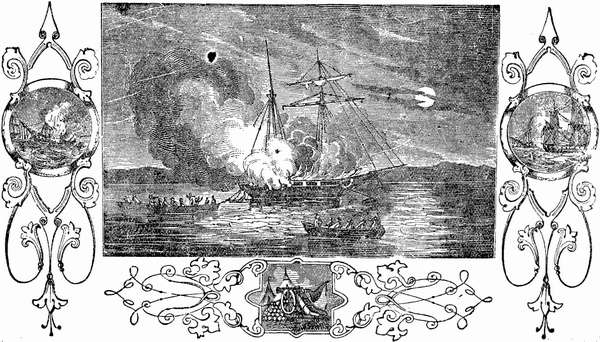Thrilling Incidents In American History
• Preface
Revolutionary War
• Opening Of The Revolution
• The Boston Massacre
• Affair of the Sloop Liberty
• Affair of the Gaspee
• The Tea Riot
• The Boston Port Bill
• The First Continental Congress-Consequent Parliamentary proceedings
• Organization of the Minute-Men
• Patrick Henry-Second Provincial Congress-First Military Enterprise
• Battles of Lexington and Concord
• Battle of Bunker's Hill
• Capture of Ticonderoga
• Second Continental Congress-Washington's Appointment
• Siege of Boston
• Incidents at the Evacuation of Boston
• Burning of Falmouth
• Arnold's Expedition to Quebec
• Siege of Quebec, and Death of Montgomery
• Scenes at Quebec during the Siege
• Expedition against Charleston
• The Declaration of Independence
• The Battle of Long Island
• Washington's Retreat through New Jersey-Capture of General Lee
• Battle of Trenton
• Battle of Princeton
• Capture of General Prescott
• Battle of Brandywine
• Battle of Germantown
• Battle of Red-Bank
• Attack on Fort Mifflin-Retirement of the Army to Valley Forge
• Battle of Bennington
• Murder of Miss M'Crea
• Battle of Stillwater
• Battle of Bemis' Heights, and Retreat of Burgoyne
• Capture of Forts Clinton and Montgomery
• Surrender of Burgoyne
• The Treaty with France
• Attack on Savannah, and Death of Pulaski
• Storming of Stony Point
• General Sullivan's Campaign against the Mohawks
• Tarleton's Quarters
• Battle of Camden, and Death of De Kalb
• Arnold's Treason
• The Loss of the Randolph
• The British Prison-Ships
• Capture of the Serapis
• Putnam's Feat at Horseneck
• Battle of Eutaw Springs
• Wayne's Charge at Green Spring
• Capture of the General Monk
• The Mutinies
• Battle of the Cowpens
• Capture of New London
• Massacre of Wyoming
• Surrender of Cornwallis
War With France
• Capture of L'Insurgente
• The Constellation and Vengeance
War With Tripoli
• Burning of the Philadelphia
• Bombardment of Tripoli
• Loss of the Intrepid
• Expedition of General Eaton
Second War With England
• Battle of Tippecanoe
• Capture of the Guerriere
• Tragical Affair of an Indian Chief
• Battle and Massacre at the River Raisin
• Captain Holmes's Expedition
• Capture of the Caledonia and Detroit
• The Wasp and Frolic
• Gallant Conduct of Lieutenant Allen at the Capture of the Macedonian
• Capture and Destruction of the Java
• Siege of Fort Meigs
• Capture of York, and Death of General Pike
• Defence of Sackett's Harbour
• Defence of Fort Stephenson
• Battle of Lake Erie
• Battle of the Thames
• Gallant Action of Commodore Chauncey under the guns of Kingston Citadel
• The Sacking of Hampton
• Capture of the Peacock
• Massacre at Fort Mimms
• Surrender of Weatherford
• Battle of Niagara
• BattIe of New Orleans
War With Mexico
• Battle of Palo Alto
• Battle of Resaca de la Palma
• Capture of Monterey
• Battle in the Streets of Monterey
• Thrilling Scenes in the Battle of Buena Vista
• Bombardment of Vera Cruz
• Battle of Cerro Gordo
• Battles of Contreras and Churubusco
• Storming of Chapultepec


AFFAIR OF THE GASPEE
 N act of violence committed by the colonists of Rhode Island, excited general
attention, from its significance as an indication of the height to which the
general current of American sentiment was rising (1772). The commander of
the Gaspee, an armed British schooner stationed at Providence, had
exerted much activity in supporting the trade laws
and punishing the increasing contraband traffic of tile Americans; and had
provoked additional resentment hy firing at the Providence packets, in order to
compel them to salute his flag by lowering theirs as they passed his vessel, and
by chasing them even into the docks, in case of refusal.
N act of violence committed by the colonists of Rhode Island, excited general
attention, from its significance as an indication of the height to which the
general current of American sentiment was rising (1772). The commander of
the Gaspee, an armed British schooner stationed at Providence, had
exerted much activity in supporting the trade laws
and punishing the increasing contraband traffic of tile Americans; and had
provoked additional resentment hy firing at the Providence packets, in order to
compel them to salute his flag by lowering theirs as they passed his vessel, and
by chasing them even into the docks, in case of refusal.
The master of a packet conveying passengers to Providence (June 9), which was fired at and chased by the Gaspee for neglecting to pay the requisite tribute of respect, took advantage of the state of the tide (it being almost high water), to stand in so closely to the shore, that the Gaspee, in the pursuit, might be exposed to run aground. The artifice succeeded; the Gaspee presently stuck fast, and the packet proceeded in triumph to Providence, where a strong sensation was excited by the tidings of the occurrence, and a project was hastily formed to improve the blow and destroy the obnoxious vessel. Brown, an eminent merchant, and Whipple, a ship-master, took the lead in this bold adventure, and easily collected a sufficient band of armed and resolute men, with whom they embarked in whale-boats to attack the British ship-of-war. At two o'clock the next morning (June 10), they boarded the Gaspee so suddenly and in such numbers, that her crew were instantly overpowered, without hurt to anyone except her commanding officer, who was wounded. The captors, having despatched a part of their number to convey him together with his private effects and his crew ashore, set fire to the Gaspee, and destroyed her with all her stores.

Boarding of the Gaspee
But no trial took place. Nobody came forward to claim the proffered reward; some persons, who were apprehended in the hope that they might be induced by threats and terror to become witnesses, were enabled by popular assistance to escape before any information could be extracted from them; and in the commencement of the following year, the commissioners reported to the British ministry their inability, notwithstanding the most diligent inquisition, to procure evidence or information against a single individual.
